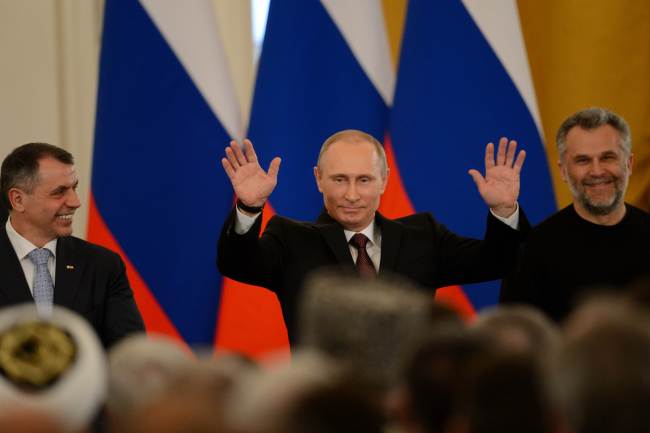[Newsmaker] World anxious about Putin’s next move
By Korea HeraldPublished : March 19, 2014 - 20:03
MOSCOW (AP) ― With Crimea in Russia’s pocket, the world anxiously awaits Vladimir Putin’s next move.
Beyond the prize of the Black Sea peninsula, a picture is emerging of what the Russian president ultimately wants from his power play: broad autonomy for Ukraine’s Russian-speaking regions and guarantees that Ukraine will never realize the Kremlin’s worst nightmare ― joining NATO.
The big question is whether Putin is willing to invade more areas of eastern Ukraine to achieve these goals.
In a televised address to the nation Tuesday, Putin said that Russia does not want a division of Ukraine. At the same time, he cast Ukraine as an artificial creation of the Soviet government that whimsically included some of Russia’s historic regions.
Beyond the prize of the Black Sea peninsula, a picture is emerging of what the Russian president ultimately wants from his power play: broad autonomy for Ukraine’s Russian-speaking regions and guarantees that Ukraine will never realize the Kremlin’s worst nightmare ― joining NATO.
The big question is whether Putin is willing to invade more areas of eastern Ukraine to achieve these goals.
In a televised address to the nation Tuesday, Putin said that Russia does not want a division of Ukraine. At the same time, he cast Ukraine as an artificial creation of the Soviet government that whimsically included some of Russia’s historic regions.

Putin’s speech made it clear that he wants the West to recognize Russian interests in Ukraine.
For the West, it all boils down to a tough dilemma over compromising with Moscow to avert military conflict or taking a hard-line stance and risking a Russian invasion of Ukraine. Putin has sent clear signals he could take extreme measures if he does not get his way on keeping Ukraine out of NATO and ensuring that Ukraine remains in Russia’s political and economic orbit.
Sunday’s referendum in Crimea, which overwhelmingly supported joining Russia, has also raised fears that Ukraine’s eastern provinces could try to hold their own independence votes.
Protesters have seized administrative buildings in several eastern cities and hoisted Russian flags over them. Some clashed with supporters of the Kiev government, raising the danger that the Kremlin could use such violence as a pretext to send in troops.
The volatile situation plays to Putin’s chief stated reason for military intervention in Ukraine: protecting ethnic Russians across the former Soviet empire. He has vowed to “use all means” to do that in Ukraine.
The Russian military has also conducted a series of massive war games alongside the 2,000-kilometer border between the two countries in an apparent demonstration of its readiness to intervene.
“Putin is prepared to keep on pushing,” said Fiona Hill, a Russia expert at the Brookings Institution in Washington. “I wouldn’t be at all surprised if he moves into other points into eastern Ukraine.”
While the West has ruled out a military response, some in Russia have struck a bellicose tone. A Kremlin-linked TV host ominously reminded viewers of his weekly news program Sunday that Russia is the only country capable of reducing the U.S. to “radioactive ashes.”
The rhetoric by Dmitry Kiselyov, who is seen as a Kremlin mouthpiece, seemed to convey a grim warning to the United States and its allies that the Russian leader would stop at nothing to achieve his goals.
Fyodor Lukyanov, head of the Council of Foreign and Defense Policies, an association of political experts, said European Union and U.S. sanctions would not stop Putin.
“If they want a (economic) war, so be it ― this is the current thinking in Moscow,” said Lukyanov.
Putin has held regular conversations with President Barack Obama and other Western leaders ― and Foreign Minister Sergey Lavrov met with Secretary of State John Kerry for six hours of talks in London last week ― with no visible result.
-
Articles by Korea Herald



















![[Today’s K-pop] Treasure to publish magazine for debut anniversary](http://res.heraldm.com/phpwas/restmb_idxmake.php?idx=642&simg=/content/image/2024/07/26/20240726050551_0.jpg&u=)